- Home
- Christina Benjamin
Retreat Again (The Retreat Series Book 2)
Retreat Again (The Retreat Series Book 2) Read online
Retreat Again
Christina Benjamin
Crown Atlantic Publishing
Contents
Title Page
Chapter 1
Chapter 2
Chapter 3
Chapter 4
Chapter 5
Chapter 6
Chapter 7
Chapter 8
Chapter 9
Chapter 10
Chapter 11
Chapter 12
Chapter 13
Chapter 14
Chapter 15
Chapter 16
Chapter 17
Chapter 18
Chapter 19
Chapter 20
Chapter 21
Chapter 22
Chapter 23
Chapter 24
Chapter 25
Chapter 26
Chapter 27
Chapter 28
Chapter 29
Chapter 30
Chapter 31
Chapter 32
Chapter 33
Chapter 34
Chapter 35
Chapter 36
Chapter 37
Chapter 38
Chapter 39
Chapter 40
Chapter 41
Chapter 42
Chapter 43
Chapter 44
Chapter 45
Chapter 46
Epilogue
Acknowledgments
47. RTA Tour
Note from the Author
About the Author
Also by Christina Benjamin
This book is a work of fiction. Any references to historical events, real people, or real locales are used fictitiously. Other names, characters, places, and incidents are the product of the author’s imagination, and any resemblance to actual events or locales or persons, living or dead, is entirely coincidental.
No part of this publication may be reproduced, stored in a retrieval system, or transmitted in any form or by any means, electronic, mechanical, photocopying, recording, or otherwise, without written permission of the publisher.
Copyright © 2017 by Christina Benjamin
All rights reserved.
Published in the United States by Crown Atlantic Publishing
Version 1.1
April 2017
For those who are still searching,
And for those who are waiting to be found.
Chapter 1
Olivia
“Dad?”
“What’s up, Livy?”
“Did you get my text?”
“No. Sorry, honey. You know how bad I am with my phone. What’s up?”
“It’s Gran.”
Olivia was met with silence on the other end of the line.
Typical.
She was twenty-two and still considered the responsible one when it came to her parents—or parent, rather. It’d been five years since her mother passed and Olivia still wasn’t used to it. And now she was about to lose her grandmother, too. She loosed a breath in frustration. “Dad, I think it’s time. We need to go home and say goodbye.”
“Okay, Liv. I’ll meet you in New York.”
“Promise?”
“I’ll be there, honey.”
The connection clicked off and Olivia shook her head. Punctuality wasn’t her father’s strong suit. Actually, being a father wasn’t her father’s strong suit, but Olivia prayed he would actually come through for once. It wasn’t so much for her sake, but for her grandmother’s. It would break Gran’s heart if her youngest son didn’t come home to say goodbye.
Gran had been battling cancer on and off for years. She was one tough old bird, as Grand liked to say. She’d beaten cancer twice, but the damn disease always seemed to find its way back. And now, at eighty-four years old, it seemed Gran was finally at peace with letting her extraordinary life come to an end.
Olivia’s grandparents weren’t your average Gram and Pop. They were Cassidy and Thomas Crain, recording legends who had built a dynasty in the music industry. Their children, Carter and Jacob, followed in their iconic footsteps, each achieving musical success in their own right. Jacob was a world-renowned principal orchestra pianist, while Carter, Olivia’s father, was the epitome of American rock royalty.
Olivia often wondered how two brothers could be so incredibly different. Her uncle Jacob was fine-boned—built for fancy suits and dexterous work. He had dark hair, blue eyes and pale skin, just like Gran. He married his high school sweetheart and fellow orchestra member, Margot Ryan. They lived in Manhattan, had three perfect daughters, Tribeca, Madison, and Brooklyn, who each strived to make their own musical footprint in the world of New York’s symphony.
And then there was Olivia’s father, Carter Crain. He was Jacob’s taller, more muscular, younger brother. Carter was wild from the beginning, with his two different colored eyes, chin length dirty blonde hair and sharp features that made women swoon. Carter spent his early days collecting tattoos, panties and passport stamps, as he toured the world with his various bands. Settling down wasn’t in Carter’s DNA. The party never stopped with him. Even when he met Olivia’s mother, Stella Laurent —a prominent French model—and got her pregnant when she was only eighteen.
To say Olivia didn’t have a conventional childhood was an understatement. She grew up on a tour bus, homeschooling herself and calling famous musicians her pseudo-aunts and uncles. To outsiders it sounded like a lot of fun, but in reality it was lonely. Olivia spent most of her time alone while her parents partied with the band at places that weren’t appropriate for a child. Those days were filled with drama, mostly fueled by drugs, alcohol and fame—three things that Olivia had come to hate about her famous family.
Olivia longed for siblings and a normal life. Perhaps that’s why her favorite childhood memories were the summers she spent at Carter Ridge with her grandparents and cousins. An overwhelming feeling of normalcy surrounded her when she was with her cousins. She marveled at the seamless way she fit in with them—right down to her matching dark hair, blue eyes and love of orchestra instruments.
When Olivia was five, her uncle Jacob introduced her to the cello and it was love at first sound. She played that whole summer, making up songs with her cousins while they sat around the campfire by her grandparents’ lake house on Carter Ridge. Gran was so impressed with Olivia’s talent and dedication that she bought Olivia her very own cello.
Looking back, those were the happiest times of Olivia’s life. Until the year she convinced her parents to let her stay with Gran and Grand at Carter Ridge, rather than rejoin them on the crowded tour bus.
That had been the year everything changed.
Chapter 2
Alex
Alex Tine pulled his hood tight against the rain as he grabbed his luggage from the cab. After four trips to carry all of his supplies inside, he was soaked to the bone. He stripped down to his boxer briefs in the foyer so he wouldn’t track sopping puddles through the house. His tattooed skin was stippled with goose bumps as he toured the legendary halls of the Carter Ridge cottage. Alex didn’t know whether he was shivering with excitement or from the weather. He still couldn’t quite believe where he was. This kind of thing never happened to him.
Well, until recently.
“I guess I better learn to get used to this, huh?” he murmured to himself.
Ever since Alex had been ‘discovered’ by the New York art scene, his life had changed over night. Alex found it absurd that one tiny article in the Huffington Post, about growing up on the streets and his strange artistic gift, had completely changed his life. He was now one of the most sought after artists in the city, with his own upcomi
ng exhibit in a swanky uptown gallery. His old crew of street artists now thought of him as a sell out—something that left a bitter taste in Alex’s mouth. They’d cut him off after his article blew up. Losing them stung. They may have been street urchins and less than upstanding citizens, but they were the only family Alex had.
He tried to shake off the bitter feeling that washed over him every time he thought of his old friends. So, what! his mind screamed. Maybe Alex had sold out, but he was through suffering for no reason. He’d done enough of that in his twenty-four years of existence. No one could argue that.
Growing up with an abusive father and a drug addict mother had shortened Alex’s childhood. He found himself parentless and on the streets by the time he was thirteen. Art and music had been the only things to save him. Not that his record was spotless. It was pretty much impossible to be a street kid in New York and escape without a criminal record. But Alex’s sordid history, along with his rare neurological disorder only seemed to help his case in the eyes of New York’s art enthusiasts.
During a chance interview after a street art rally-turned-riot, Alex explained how he came up with his graffiti tag, which was a red ‘A’ crossed with a yellow ‘T’. He’d told the reporter, “My tag came across naturally. I have synesthesia. It’s simply how I see the world. Letters, numbers, faces and music, they’re all assigned a certain color and I’m the only one who can see it.”
Having never heard of synesthesia, the reporter seemed enthralled with Alex’s story, asking him questions about his past and for photos of some of his art. It turned out the random reporter had a lot of clout in the art community and the next thing Alex knew, he was one of New York’s ‘Next Big Things.’ He even ended up in Forbes Magazine’s 30 Under 30 to Watch. Now headlines like, ‘Rags to Riches’, ‘From the Streets to SoHo’, or ‘Synesthesia-mania’, followed Alex, gaining him exposure and invites into a world he didn’t even know existed, let alone how to navigate—the Manhattan elite.
The article and whirlwind of fame that followed was how Alex found himself at the Carter Ridge retreat house. He still couldn’t believe it was actually happening. It was all so surreal. Only a few months ago he’d been squatting in a dingy apartment in Brooklyn with no power and now here he was in a place that seemed more myth than reality.
He pinched himself as he roamed the iconic hallways of the renowned musicians cottage tucked away in the Smoky Mountains. His idols from the music industry stared back at him from rows and rows of framed black and white photographs. Alex suddenly felt like a giddy teenager with the keys to an amusement park. Being at Carter Ridge was a dream he never even dared to have.
“Thank you Cassidy Crain,” he whispered, recalling their chance encounter that brought him here.
Alex met Cassidy at a charity event in Manhattan. She was outbid for one of his paintings and decided to introduce herself. After an interesting conversation, Cassidy insisted Alex come to the Carter Ridge house to work on his upcoming art installment. He’d never forget their conversation.
“Do you have a girlfriend, Alex?”
“No, ma’am.”
“A boyfriend?”
“No, ma’am.”
“Enough with calling me ma’am. I already feel ancient as it is. Cassidy will be just fine.”
“Sorry. I was just trying to be respectful. And I would never call you ancient. Your music is legendary.”
“Ha!” Cassidy’s raspy laugh filled the air as she swirled a rocks glass of clear liquid. “Legends are old. But enough about me, my dear. What about you? I’m interested in your art, but I understand you have an arrest record?”
“Yes, ma-, I mean, Cassidy. I’m not trying to hide it. It was in the paper.”
“I read the article. It all seemed rather harmless, and associated to your street art, I gather?”
“Yes.”
“So no arrests for anything violent?”
Alex shook his head. He was beginning to feel like he was being interrogated.
“Or drugs?”
“No. I find drugs take away the things we love from the world and I’m more interested in giving them back.”
“I couldn’t agree more,” Cassidy murmured taking Alex’s hand. “Alex, I think you’re exactly who I’ve been looking for. I’d like to sponsor you and give you a space to work on your art at our retreat home.”
“Carter Ridge?”
“You know it?”
Alex swallowed hard trying to act cool. “Yes, of course. But that’s such an incredible gesture. You don’t have to—”
“I insist.” Cassidy interrupted. “Supporting an artist like yourself is my duty. There’s something special about you, my dear. Trust me, I know these things.” Cassidy winked and pressed a card into the palm of Alex’s hand. “Call this number tomorrow and we’ll take care of the arrangements.”
And now here he was, walking in the footsteps of legends.
Ever the opportunist, Alex didn’t waste time getting settled. Growing up on the streets he’d learned every moment counted and he didn’t want to squander one second at Carter Ridge. He did his best to resist his overwhelming urge to marvel at every reference of the incredible talent that had graced the artist’s retreat home over the years. But as he unpacked his supplies, he found the task impossible. There were photographs everywhere—pictures of Bruce Springsteen and Aretha Franklin greeted him as he stocked the kitchen. Simon and Garfunkel’s Grammy kept his clothes company in the bedroom across the hall, and platinum albums from the likes of David Bowie, Carol King and Fleetwood Mac hung on the wall in the legendary recording room that would become his painting studio for the next few weeks.
Once the large recording room was protected with drop cloths and Alex had finished setting up his canvases, paints, and lighting, he decided he needed to do something to take the edge off the enormous pressure he felt to create genius while surrounded by it. He needed to go for a run.
Even though the rain was still pouring down, Alex craved the calming effects a run would bring. Blaring music and pounding pavement was his favorite way to clear his mind and exercise his demons. Without immersing himself in art and music, Alex found it hard to keep his mind from slipping into the chaos of color and dark memories. The constant stimulus could become overwhelming. That’s when he turned to running.
Grabbing his ear buds and running shoes, Alex donned shorts, a t-shirt, and a lightweight jacket to help keep the rain at bay. As he went to grab the house key off the hook by the front door, he paused to look at the large black frame labeled ‘Family’ in elegant scrolling white letters that hung above the key hooks. It contained a black and white photograph of Cassidy and Thomas Crain, along with their children and grandchildren. Alex loved black and whites. Seeing the world as someone with synesthesia already meant there was an excess of color. Black and white photographs made it easier for Alex to focus on people’s true colors.
As he studied the photo, his eyes were drawn to a thin, sullen-looking girl nestled between a gorgeous woman and the unmistakable Carter Crain. On closer inspection, Alex realized what had caught his eye about the girl. He saw something so unexpected when he looked at her that his pulse quickened.
A color radiated so strongly that it drowned out all the other colors that usually clouded Alex’s overactive sensory perception. Alex gaped open-mouthed at the photo. Even with his rare neurological disorder, it was unusual for him to have such a strong reaction to a photograph. And only once before had he seen the color that surrounded the girl—robin’s egg blue.
Chapter 3
Olivia
“I miss you too, Grand. Tell Gran I love her and I’ll be home soon.”
Olivia hung up her phone and boarded her plane at LAX. She’d made the flight to New York more times than she could count in the four years she’d lived in LA. But to Olivia, New York would always be home.
She moved to LA with her dad after her mom died. He said it was better for his music career, but Olivia knew he was reall
y running away. And at the time, she hadn’t minded. Stella Crain had been a prominent member of New York’s fashion and social scene, and the ravenous New York press had been relentless and cruel in their coverage of her tragic death. Olivia wanted more than anything to get away from the drama. But moving didn’t help. If anything, LA made things worse.
Moving to LA meant Olivia was giving up her dreams of attending Juilliard in New York. And after deferring for a year to try and pick up her life after losing her mother, Olivia found she’d lost something else dear to her—her passion for music.
Olivia struggled as a music major for a year at UCLA. But it became apparent that her role in her mother’s death had shattered Olivia so irrevocably that she no longer possessed her once fierce passion for music. She no longer possessed a passion for anything, for that matter. And without the joy Olivia once found in music, everything just got worse. Especially once word got around to her classmates that her father was famous rock star, Carter Crain.
As usual, everyone pretended to want to be Olivia’s friend. But in reality, what they really wanted were free concert tickets and gossip about who her dad was sleeping with and who she knew in the music industry.
The answer to both was practically everyone.
Not that she’d ever admit that.
Making friends wasn’t easy for Olivia. Explaining how she’d grown up going to the Grammy’s and MTV Music Awards would only make things worse. Olivia never bragged that her grandparents were in the Music Hall of Fame or that her father’s picture plastered every Hard Rock Café across the country. It wasn’t like she was embarrassed of them. She was proud of their success. But she hated that no matter how brightly they shined in their careers, the world always seemed to focus on the darkness surrounding their personal lives.

 Palmetto Passion: A Sweet Small Town Family Romance (The Bradford Brothers Book 1)
Palmetto Passion: A Sweet Small Town Family Romance (The Bradford Brothers Book 1) Playing the Field
Playing the Field Kissing The Hero (The Dangers of Dating a Diva Book 2)
Kissing The Hero (The Dangers of Dating a Diva Book 2) The Winter Boyfriend: A Stand-Alone YA Contemporary Romance Novel (The Boyfriend Series)
The Winter Boyfriend: A Stand-Alone YA Contemporary Romance Novel (The Boyfriend Series) Cooper: A Clean Billionaire Romance (The Billionaire Boyfriend Series Book 2)
Cooper: A Clean Billionaire Romance (The Billionaire Boyfriend Series Book 2) The Stand-In Boyfriend: A YA Contemporary Romance Novel (The Boyfriend Series Book 5)
The Stand-In Boyfriend: A YA Contemporary Romance Novel (The Boyfriend Series Book 5) Tomboys Don't Love Christmas
Tomboys Don't Love Christmas Young Adulting
Young Adulting The Boyfriend Series Box Set (Books 1-6): YA Contemporary Romance Novels
The Boyfriend Series Box Set (Books 1-6): YA Contemporary Romance Novels Christmas in Pine Island: A small town holiday romance
Christmas in Pine Island: A small town holiday romance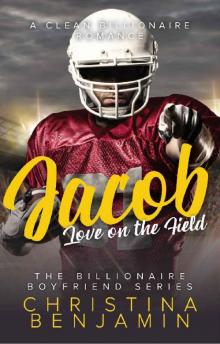 Jacob
Jacob The Accidental Boyfriend: A YA Contemporary Romance Novel (The Boyfriend Series Book 7)
The Accidental Boyfriend: A YA Contemporary Romance Novel (The Boyfriend Series Book 7) The Maybe Boyfriend
The Maybe Boyfriend The Geneva Project - Truth
The Geneva Project - Truth Retreat To Me (The Retreat Series Book 1)
Retreat To Me (The Retreat Series Book 1) Retreat Again (The Retreat Series Book 2)
Retreat Again (The Retreat Series Book 2) The Stand-In Boyfriend
The Stand-In Boyfriend The Almost Boyfriend (The Boyfriend Series Book 2)
The Almost Boyfriend (The Boyfriend Series Book 2) The Goodbye Boyfriend (The Boyfriend Series Book 3)
The Goodbye Boyfriend (The Boyfriend Series Book 3)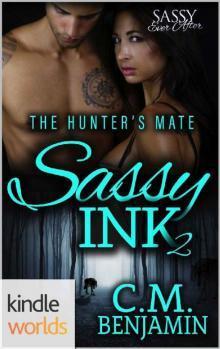 The Hunter's Mate
The Hunter's Mate The Summer Boyfriend
The Summer Boyfriend Sassy Ever After: Sassy Ink 3: The Hunter's Curse (Kindle Worlds Novella)
Sassy Ever After: Sassy Ink 3: The Hunter's Curse (Kindle Worlds Novella)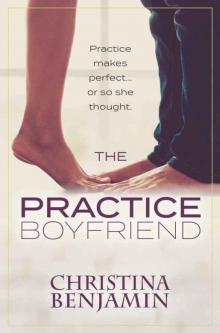 The Practice Boyfriend (The Boyfriend Series Book 1)
The Practice Boyfriend (The Boyfriend Series Book 1)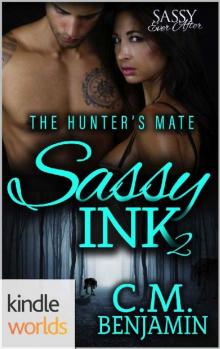 Sassy Ever After_Sassy Ink 2_The Hunter's Mate
Sassy Ever After_Sassy Ink 2_The Hunter's Mate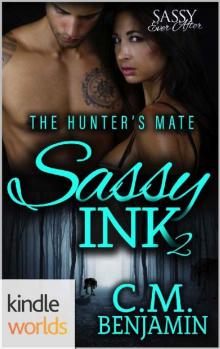 Sassy Ever After: Sassy Ink 2: The Hunter's Mate (Kindle Worlds Novella)
Sassy Ever After: Sassy Ink 2: The Hunter's Mate (Kindle Worlds Novella) The Maybe Boyfriend: A YA Contemporary Romance Novel (The Boyfriend Series Book 6)
The Maybe Boyfriend: A YA Contemporary Romance Novel (The Boyfriend Series Book 6)